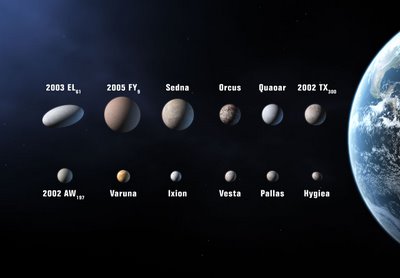
Okay, I haven't dropped the topic of the new planet definition debate. It's not as exciting as a visit to San Diego, the war in Lebanon, or anime fan fiction... but this whole planet changing thing is something we could be stuck with if things go wrong. The current favored definition being tossed would classify the asteroid Ceres and the moon Charon as planets. Pluto and Xena would also be planets. On top of that, there are a bunch of other objects floating around our solar system (that I've never heard of) that could potentially be classified as planets.
 Clearly the astromers have all gone mad. This planetary definition is not going to slide with the public, and even high-brow nerds such as myself will look at this new planetary model with disdain. First of all, the names of some of these new planets are pretty sad. Xena is cool, and Charon and Ceres are passible... but what about Sedna and Hygiea? It's clear to me that astronomers shouldn't be the ones that name these things, and I'm starting to question if they should be the ones to classify them either.
Clearly the astromers have all gone mad. This planetary definition is not going to slide with the public, and even high-brow nerds such as myself will look at this new planetary model with disdain. First of all, the names of some of these new planets are pretty sad. Xena is cool, and Charon and Ceres are passible... but what about Sedna and Hygiea? It's clear to me that astronomers shouldn't be the ones that name these things, and I'm starting to question if they should be the ones to classify them either.

5 comments:
I classify a planet as anything that orbits a star and nothing else. Is that too simplistic?
If we use that definition, then everything in the asteroid belt can be considered a planet. Personally, I think that people expect a planet to be of a certain size. But astronomers aren't willing to do this because they don't think it's a scientific way to define a planet.
If they use this new definition, then a circular pebble that orbits the sun can be considered a planet too. Personally, I think they should consider atmosphere in the definition. If it's round, orbits the sun, and has it's own atmosphere then it's clearly a planet.
When you have to keep changing the defition when a new exception is found, the original definition is weak.
isn't it now offical that Pluto is no longer a planet?? that's what Gord Martineau just told me.
Pluto has officially been booted as a planet. I highly endorse the move.
Post a Comment